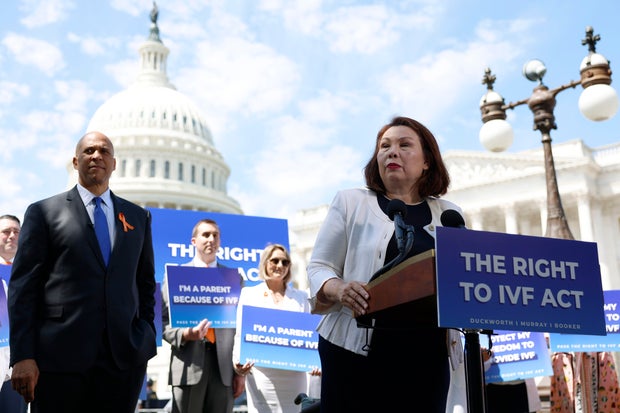Washington — The Senate is voting Thursday on a legislative package to protect access to IVF, as Democrats make a push around reproductive rights this month — two years after the Supreme Court overturned Roe v. Wade — despite near-certain opposition from Republicans.
The issue came to the national attention after the Alabama Supreme Court ruled earlier this year that embryos are considered children under state law, prompting providers to halt fertility treatments. The legislature later approved legislation to protect IVF in the state.
Across the nation, Democrats put the blame on Republicans as the development raised concern about similar moves elsewhere, warning of a new front in the fight over reproductive rights.
“The anti-abortion movement is not yet finished. Now that Roe is gone, they have set their sights on a new target: in vitro fertilization,” Senate Majority Leader Chuck Schumer said Thursday morning ahead of the vote. “So today the question before the Senate is very simple: Do we agree that Americans should be free to use IVF if they want to?”
The upper chamber is taking a procedural vote on the package, called the Right to IVF Act, made up of four bills, some of which have previously been blocked by Senate Republicans. The package, which has almost no chance of being approved, is sponsored by Sens. Tammy Duckworth of Illinois, Patty Murray of Washington and Cory Booker of New Jersey, and centers on a right to receive and provide IVF services, while working to make the treatments more affordable.
One measure would create a statutory right for access to assisted reproductive services like IVF. Duckworth tried to secure passage of the bill in February under unanimous consent, but one Republican senator objected, claiming that it would go too far. The package also includes a measure geared toward expanding access to the fertility treatments for veterans, which was likewise blocked by a Republican senator earlier this year. Other provisions are aimed at lowering costs for Americans by requiring insurance plans to cover IVF.
Another push related to reproductive rights fell short in the Senate last week, when Democrats tried to advance legislation protecting access to contraception, with most Republicans opposing the measure. The two votes come as part of an effort by Democrats to highlight reproductive rights this month, with an eye toward the November elections, which Republicans have criticized. But Schumer argues that the votes aren’t mere messaging votes.
“Protecting IVF, like protecting contraception, is not a show vote,” Schumer said at a news conference on Wednesday. “It’s a show-us-who-you-are vote.”
Republicans argue as they did ahead of the contraception vote that IVF isn’t under fire. But Democrats say the Alabama ruling tells a different story. And on Wednesday, the largest Protestant denomination adopted a resolution criticizing IVF, calling on Southern Baptists to “reaffirm the unconditional value and fight to life of every human being, including those in an embryonic stage.”
However, Senate Democrats want to put Republicans on the record over the issues related to reproductive rights issues, which has been a driving force at the polls.
“Every single Republican needs to answer clearly for the record: do you want our laws to protect IVF or do you want laws that say frozen embryos have the same rights as living, breathing human beings?” Murray said at a news conference on Wednesday. “You cannot have both.”
When it comes to IVF, although Senate Republicans have expressed support for the fertility treatments in the wake of the Alabama ruling, lawmakers appear to be at odds over a path forward that would satisfy both parties.
Last month, two Senate Republicans, Sens. Ted Cruz of Texas and Katie Britt of Alabama, introduced legislation to protect access to IVF, urging bipartisan support. But Democrats quickly pushed back on the legislation, questioning its scope and mechanism.
The GOP bill, called the IVF Protection Act, would require that states “do not prohibit in vitro fertilization” as a condition for the states to receive federal funding for Medicaid, which provides health insurance for low-income Americans. The bill doesn’t compel an organization or individual to provide IVF services, and it doesn’t preclude states from otherwise regulating IVF — which Democrats generally oppose.
On Wednesday, Cruz and Britt attempted to approve the legislation under unanimous consent, in order to preempt the Democrat-led vote on Thursday. But Murray blocked the move, calling it a “PR tool” and argued that it’s “ridiculous to claim that this bill protects IVF when it does nothing of the sort.”
Murray and other Democrats have highlighted concerns over granting personhood rights to embryos, since embryos are often discarded during fertility treatments. They’ve warned that the GOP legislation doesn’t address the handling of frozen embryos, which could threaten access to the fertility treatments, while saying it’s an intentional move to appeal to the anti-abortion movement.
All 49 Senate Republicans signed on to a statement released later Wednesday reiterating their support for the fertility treatments, saying they “strongly support continued nationwide access to IVF.”
Some Republicans argue, as they did ahead of the contraception vote, that IVF isn’t under fire. But Democrats say the Alabama ruling tells a different story. And on Wednesday, the country’s largest Protestant denomination adopted a resolution criticizing IVF, calling on Southern Baptists to “reaffirm the unconditional value and fight to life of every human being, including those in an embryonic stage.”
Though the Democrats’ IVF package isn’t likely to advance, at least one Republican, Sen. Susan Collins of Maine, said she intends to vote to advance the IVF package. She told reporters she doesn’t want “the message to be that Republicans are against IVF,” but she also noted that the move is “clearly not a serious attempt at legislating.”
And Sen. Lisa Murkowski, an Alaska Republican, said Wednesday she was still looking at the components of the package. The two Republicans were the only members of their party to vote in favor of advancing the contraception legislation last week.
Alan He contributed reporting.

